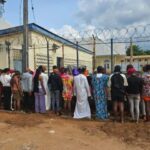An open letter to the Presidential Committee on Dialogue and Peaceful Resolution of Security Challenges in the North
By Samuel Akpobome Orovwuje
For nearly three years now, the Boko Haram insurgency has committed massacres, tortures and countless other atrocities beyond the reach of the military high command and its humanitarian interventions and above all far from the attention of the Nigerian state ( the presidency and of the Northern state governors). The Boko Haram began its insurgency in Northern Nigeria particularly in Borno, Kano, Niger and the FCT just to mention a few in 2009, claiming that it was fighting for the eradication of western education. This insurgency has displaced a lot of persons in the North, obliging them to migrate with a view to seeking refuge in other part of Nigeria.
At the outset of the crisis, the Nigerian state through the presidency sought to end the insurgency primarily through military means and might but the boko haram was able to operate from bases beyond the military and the state security immediate reach.
The Presidential Committee on dialogue and peaceful resolution of security challenges in the north has just been inaugurated by the President Good luck Ebele Jonathan with a view to finding solutions to tensions and atrocities committed by the boko haram. As the committee settle down to work, one of the key issues is to confront the challenges inherent in pursuing peace and justice simultaneously. The key questions that should bother the committee beyond the term of reference handed down by the president is what happens- and what should happen where efforts to prosecute perpetrators of mass atrocities coincide with an amnesty process, what is more, what is the best approach when the price of amnesty may be the degree of impunity for those responsible for such heinous and horrendous abuses?
One common and convenient responses I suspect is to hide behind logical reasoning and make general statement of principle to the effect that no trade – off is required because peace and justice are inextricably linked and therefore peace and justice are complementary, in that justice can deter abuses and can help to make peace sustainable in the short and long run by addressing the fundamental grievances non violently. But as the popular street language would say good things do not always go together, and to prevent peace and justice as invariably mutually reinforcing is misleading and unhelpful when the difficult reality of peace making in Nigeria has often proven otherwise. The amnesty granted to Niger Delta militant is still very fresh in our mind. However, while impunity for people who have committed the gravest acts of inhumanity is morally repugnant, but doing deal or business with them is unavoidable and necessary to prevent further civilian casualties and human suffering because the reality of the insurgency is such that perpetrators have committed atrocities, peace negotiations will often assemble parties responsible for grave abuses and a deal will depend on their agreeing to end the conflict because the boko haram groups are unlikely to want a prison cell as reward for cease fire, mediators in this regard have frequently used amnesties as incentives to broker peace deals in other climes and Nigeria should not be an exception. Providing a further justification for the proposed amnesty can be found in article 6(5) of the 1977 additional protocol of Geneva Convention which posits that amnesty may be a necessary negotiation tool to resolving internal conflicts like the boko haram. The gesture of reconciliation is therefore a welcome development and should be seen beyond primordial sentiments that often shape our national discourse and nation building efforts. On the hand, others would argue that peace cannot be bartered in exchange for justice will be justifying indirectly to the prolongation of the killing in the north with a likely spill over to other part of the country.
As the committee settles down to business I would like to propose the following critical issues that are
key and fundamental in seeking sustainable peace is to take a closer look at the history of governance in the country. The political system that worked before and after independence was based on rules and traditions that promote social harmony, order and sense of community, but the current western style winner- take – all method and dictatorial democracy among the so called elites and the larger political class has made nonsense of social order and sense of community and communal ownership has become elusive. The legacy of self- reliance and real private enterprise has also vanished in the last 30 years or so. There is too much government, but too little in performance and result at the state and federal levels has created strong agitations which has always led to anarchy, tyranny and most times government and institutional representatives becoming too powerful and potentially destructive in their quest to cling to power at all cost. It is necessary therefore that the committee should take closer look at the broader challenge of consensus – building for the emergence of community, religious and political office holders would eliminate violent conflicts to their barest minimum. Establishment of good governance is essential for fostering the development of security and economic growth in the north.
The criminal justice administration is also grossly inefficient in apprehending and prospecting offender of violent crime thereby weakling incentives for communities and individuals in helping to expose criminal activities before they become threat to national security. Security Sector Reform (SSR) should be the flagship for rebuilding security forces and law enforcement particularly the police towards disarmament, demobilization, and reintegration (DDR); and justice supported by the emirate system in the north.
It is also important that the committee should avoid the top- down approach to conflict management which has always being the case with Nigeria through the institution of national transformation agenda or projects by addressing the root causes of violent conflict and aggregating all possible conflicts that are likely to ensue from the north whether are political and religious in nature and character. Interpreting the
current violence and incorporating how civilian suffering is used as political strategy would help to unravel other hidden agenda. Individuals and organisations outside the government concerned with the protection of civilian must also be engaged in the dialogue to promote and shape pro- civilian sentiments in the amnesty initiative.
Eradication of extreme poverty should also be within the term of reference of the committee particularly with the recently federal government adopted millennium development goals (MDG). The North just like the Niger Delta region needs a national development strategy over the next ten years to favour the poor by building their productive assets and expanding their revenue base will go long way in serving as a disincentive to the criminal groups within and from outside. Fighting corruption is a major security challenge facing Nigeria and by extension the north. The Transparency International ranks Nigeria 139th in terms of the corruption perception index (CPI), among the 176th countries surveyed. Corruption remains one of the major obstacles in the reform and development. There are quick answers to issues of security challenges. But making the right decisions on fighting poverty and adopting a zero- tolerance approach for corrupt government officials can contribute to achieving long peace goals.
With the increasing demand for amnesty for criminal gangs and genuine agitation for the politics of inclusiveness across the length and breadth of Nigeria and the cry for justice in the land, it is imperative therefore on the presidential committee on dialogue and peaceful resolution of security challenge in the north to push for a bill to the national assembly for the legislation of an Amnesty act to address the danger of dealing with emergent conflicts in a selected manner which is already a drain on the national treasury. Perhaps it is also necessary through the instrumentality of the national assembly to establish an Amnesty Commission or a Truth Commission to address the lingering national question in our quest for real democracy that is based on the rule of law. This call has become necessary since the convocation of a national sovereign conference is yet to come to fruition. The Amnesty commission through enabling legislation will help to find answers to one, provided the victims with psychological support as well as monetary reparation for crimes committed against them, two, and upheld the right of families of victims to know about the violence perpetrated against their kin. The proposed Amnesty commission will be beneficial to the country at large in that it would help to spot light institutional failures that are causing violent conflicts and making recommendations to forestall future occurrence and above all, it will helping in fostering spirit of national dialogue and thereby reinforcing the importance of transparent governmental institutions in Nigeria.
By Samuel Akpobome Orovwuje
Humanitarian Affairs Specialist and Founder, Humanitarian Care for Displaced Persons, Lagos.





















